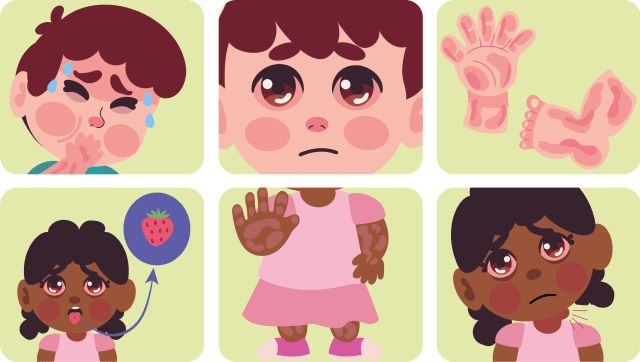Caution: tantrum ahead
Why toddlers have meltdowns, and what you can do to diffuse them.
Article Date:

If you're a parent, you probably know all about the so-called "terrible twos." If you're not, you've probably witnessed them: epic temper tantrums and complete meltdowns in grocery store aisles, parks and other very public places.
Temper tantrums: unpredictably predictable
Even little angels lose their cool every now and then. In fact, the odds of a toddler having a temper tantrum are about the same as that of the sun rising in the morning. But with the sun, at least you know when it's going to happen.
Actually, tantrums are somewhat predictable because they usually occur when toddlers get frustrated due to being hungry, tired, bored, not understood or not getting their way. The onset of tantrums often arrives just as toddlers are starting to gain skills in mobility, dexterity and communication. Many act out as a way of exerting their independence and dissatisfaction when their wishes aren't immediately addressed.
As they start walking and exploring their environment, toddlers gain a feeling of control. For a 2-year-old, this often leads to a power struggle with mom and dad.
"Tantrums can be a sign of normal development. Toddlers are exploring ways to meet their wants and needs, and that involves testing parents' limits for their behavior," said De'Von Patterson, PhD, a psychologist with Baptist Behavioral Health. "They're trying to learn about the environment and expectations. 'How consistently can I get what I want?' 'What behaviors will work?' Tantrums are typically the first 'go-to,' as they're learning to express their needs in other ways and adjust their expectations for how things work around them."
Taming a toddler's tantrum
Normal as it may be, it's easy for parents to get frustrated (and maybe even embarrassed) when their little one is melting down in Target for the third time this week. So, what should you do?
"The easiest thing to do in a situation like that – when your little one wants the toy or candy and you already said no – is to just give them what they want," said Ashley Hart-McGlynn, BCBA, a behavior analyst with Baptist Behavioral Health. "However, I don't advise this because it can actually make this type of behavior worse and more persistent. I would instead recommend acknowledging that you've heard them, providing a brief explanation for why the answer's no, and trying to ignore any other ploys or negotiations from your toddler. Avoiding a power struggle is difficult, but using a calm voice and giving clear expectations will pay off in the long run."
Hart-McGlynn offered tips to ward off tantrums before they start:
Set clear and concise expectations.
Bring a toy from home to occupy them while out on errands or make a "wait bag" with fun items inside.
Model the behavior and emotions you want your child to learn.
Pick your battles. If you don't have the energy to follow through on a "no," perhaps you say "yes" this time.
"It's OK to say 'yes,' but if you've already told the child 'no' and then change your mind based on their behavior, your child is learning that acting out will ultimately get them what they want," said Hart-McGlynn.
When it comes to what you can do to reduce the frequency of tantrums, there are a few things to keep in mind. For instance, be careful how you phrase a request.
"Try not to phrase something as a question when, in reality, you're not asking them to do it as much as telling them," said Hart-McGlynn. "For example, instead of saying, 'Are you ready for dinner?' try, 'It's time to come to the table for dinner.' This gives the child clear direction and minimizes the opportunity for pushback."
Giving your child some control may go a long way. For example, you can let your little one choose between two options for a snack. Positive attention and reinforcement also help, as well as staying in tune with your toddler's sleep and eating schedule so he or she doesn't get overtired or hungry.
When to seek help
At what point, then, do you know if your toddler's defiant behavior has become an issue that needs assessment and intervention from a professional?
"If the episodes are getting more intense and frequent or your child is unable to recover for an extended period of time, it may be time to seek help from a mental health professional," said Dr. Patterson.
Concerned about your toddler's behavior?
Your child's pediatrician can help you address behavioral and other health concerns. To find the right provider for you and your family, call 904.202.4YOU (4968) or fill out the appointment request form.



